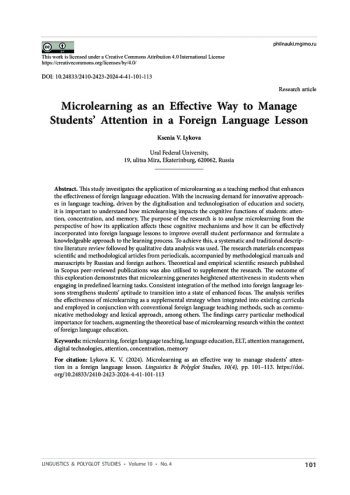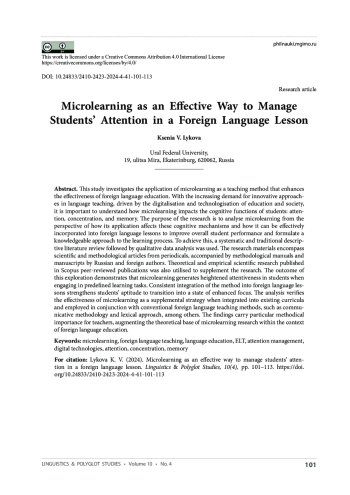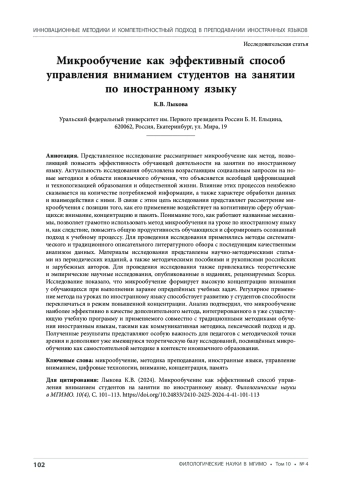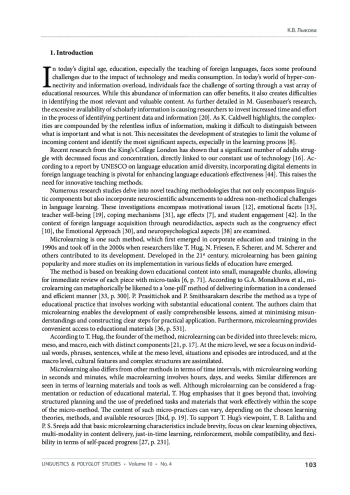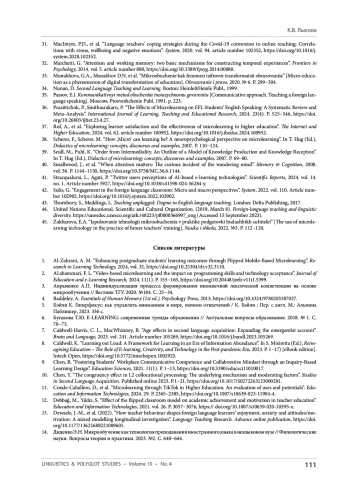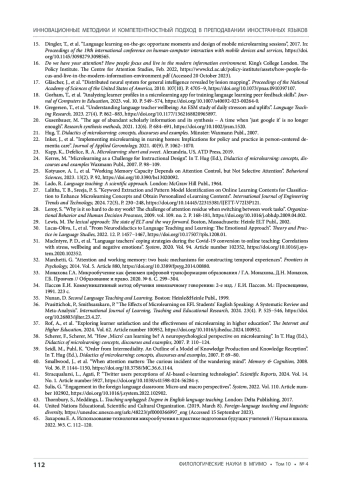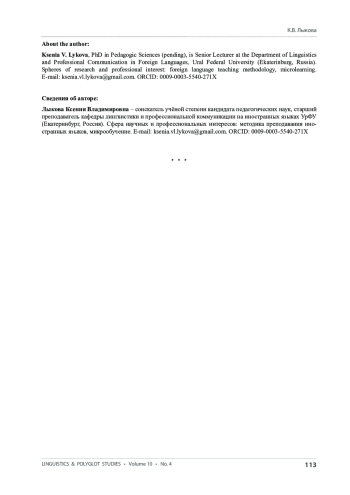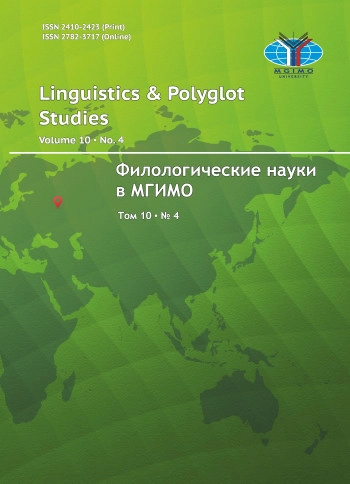1. Al-Zahrani, A. M. “Enhancing postgraduate students’ learning outcomes through Flipped Mobile-Based Microlearning”. Research in Learning Technology, 2024, vol. 32,. DOI: 10.25304/rlt.v32.3110
2. ALshammari, F. L. “Video-based microlearning and the impact on programming skills and technology acceptance”. Journal of Education and e-Learning Research, 2024. 11(1). P. 155-165,. DOI: 10.20448/jeelr.v11i1.5399 EDN: EBQQZA
3. Авраменко А.П. Индивидуализация процесса формирования иноязычной лексической компетенции на основе микрообучения // Вестник ТГУ. 2020. №184. С. 25-34.
4. Baddeley, A. Essentials of Human Memory (1st ed.). Psychology Press, 2013,. DOI: 10.4324/9780203587027
5. Бэйли К. Гиперфокус: как управлять вниманием в мире, полном отвлечений / К. Бэйли; Пер. с англ. М.: Альпина Паблишер, 2023. 336 с.
6. Бугакова Т.Ю. E-LEARNING: современные тренды образования // Актуальные вопросы образования. 2018. № 1. С. 70-73. EDN: XWDPNJ
7. Caldwell-Harris, C. L., MacWhinney, B. “Age effects in second language acquisition: Expanding the emergentist account”. Brain and Language, 2023. vol. 241. Article number 105269,. DOI: 10.1016/j.bandl.2023.105269
8. Caldwell, K. “Learning out Loud: A Framework for Learning in an Era of Information Abundance”. In S. Mistretta (Ed.), Reimagining Education - The Role of E-learning, Creativity, and Technology in the Post-pandemic Era, 2023. P. 1-17). Intech Open,. DOI: 10.5772/intechopen.1002923
9. Chen, R. “Fostering Students’ Workplace Communicative Competence and Collaborative Mindset through an Inquiry-Based Learning Design”. Education Sciences, 2021. 11(1). P. 1-13,. DOI: 10.3390/educsci11010017
10. Chen, Y. “The congruency effect in L2 collocational processing: The underlying mechanism and moderating factors”. Studies in Second Language Acquisition. Published online 2023. P.1-21,. DOI: 10.1017/S0272263123000281
11. Conde-Caballero, D., et al. “Microlearning through TikTok in Higher Education. An evaluation of uses and potentials”. Education and Information Technologies, 2024. 29. P. 2365-2385,. DOI: 10.1007/s10639-023-11904-4 EDN: DINYZQ
12. Debbağ, M., Yıldız, S. “Effect of the flipped classroom model on academic achievement and motivation in teacher education”. Education and Information Technologies, 2021. vol. 26. P. 3057-3076,. DOI: 10.1007/s10639-020-10395-x EDN: JSUROD
13. Dewaele, J.-M., et al. (2022). “How teacher behaviour shapes foreign language learners’ enjoyment, anxiety and attitudes/motivation: A mixed modelling longitudinal investigation”. Language Teaching Research. Advance online publication,. DOI: 10.1177/13621688221089601
14. Диденко Э.Н. Микрообучение как технология преподавания иностранного языка в неязыковом вузе // Филологические науки. Вопросы теории и практики. 2023. №2. С. 640-644. EDN: NWRUOJ
15. Dingler, T., et al. “Language learning on-the-go: opportune moments and design of mobile microlearning sessions”, 2017. In: Proceedings of the 19th international conference on human-computer interaction with mobile devices and services,. DOI: 10.1145/3098279.3098565
16. Do we have your attention? How people focus and live in the modern information environment. King’s College London. The Policy Institute. The Centre for Attention Studies, Feb. 2022, https://www.kcl.ac.uk/policy-institute/assets/how-people-focus-and-live-in-the-modern-information-environment.pdf (Accessed 20 October 2023).
17. Gläscher, J., et al. “Distributed neural system for general intelligence revealed by lesion mapping”. Proceedings of the National Academy of Sciences of the United States of America, 2010. 107(10). P. 4705-9,. DOI: 10.1073/pnas.0910397107
18. Gorham, T., et al. “Analyzing learner profiles in a microlearning app for training language learning peer feedback skills”. Journal of Computers in Education, 2023. vol. 10. P. 549-574,. DOI: 10.1007/s40692-023-00264-0 EDN: AJDARB
19. Gregersen, T., et al. “Understanding language teacher wellbeing: An ESM study of daily stressors and uplifts”. Language Teaching Research, 2023. 27(4). P. 862-883,. DOI: 10.1177/1362168820965897 EDN: EISMYM
20. Gusenbauer, M. “The age of abundant scholarly information and its synthesis - A time when ‘just google it’ is no longer enough”. Research synthesis methods, 2021. 12(6). P. 684-691,. DOI: 10.1002/jrsm.1520 EDN: PWNGKF
21. Hug, T. Didactics of microlearning: concepts, discourses and examples. Münster: Waxmann Publ., 2007.
22. Inker, J., et al. “Implementing microlearning in nursing homes: Implications for policy and practice in person-centered dementia care”. Journal of Applied Gerontology, 2021. 40(9). P. 1062-1070. EDN: UIUGWA
23. Kapp, K., Defelice, R. A. Microlearning: short and sweet. Alexandria, US, ATD Press, 2019.
24. Kerres, M. “Microlearning as a Challenge for Instructional Design”. In T. Hug (Ed.), Didactics of microlearning: concepts, discourses and examples Waxmann Publ., 2007. P. 98-109.
25. Kotyusov, A. I., et al. “Working Memory Capacity Depends on Attention Control, but Not Selective Attention”. Behavioral Sciences, 2023. 13(2). P. 92,. DOI: 10.3390/bs13020092 EDN: CFWZYX
26. Lado, R. Language teaching: A scientific approach. London: McGraw Hill Publ., 1964.
27. Lalitha, T. B., Sreeja, P. S. “Keyword Extraction and Pattern Model Identification on Online Learning Contents for Classification to Enhance Microlearning Concepts and Obtain Personalized eLearning Contents”. International Journal of Engineering Trends and Technology, 2024. 72(3), P. 230-248,. DOI: 10.14445/22315381/IJETT-V72I3P121 EDN: TKEHEX
28. Leroy, S. “Why is it so hard to do my work? The challenge of attention residue when switching between work tasks”. Organizational Behavior and Human Decision Processes, 2009. vol. 109. no. 2. P. 168-181,. DOI: 10.1016/j.obhdp.2009.04.002
29. Lewis, M. The lexical approach: The state of ELT and the way forward. Boston, Massachusetts: Heinle ELT Publ., 2002.
30. Lucas-Oliva, I., et al. “From Neurodidactics to Language Teaching and Learning: The Emotional Approach”. Theory and Practice in Language Studies, 2022. 12. P. 1457-1467,. DOI: 10.17507/tpls.1208.01 EDN: MSPKPY
31. MacIntyre, P. D., et al. “Language teachers’ coping strategies during the Covid-19 conversion to online teaching: Correlations with stress, wellbeing and negative emotions”. System, 2020. Vol. 94. Article number 102352,. DOI: 10.1016/j.system.2020.102352
32. Marchetti, G. “Attention and working memory: two basic mechanisms for constructing temporal experiences”. Frontiers in Psychology, 2014. Vol. 5. Article 880,. DOI: 10.3389/fpsyg.2014.00880
33. Монахова Г.А. Микрообучение как феномен цифровой трансформации образования / Г.А. Монахова, Д.Н. Монахов, Г.Б. Прончев // Образование и право. 2020. № 6. С. 299-304. EDN: APATGG
34. Пассов Е.И. Коммуникативный метод обучения иноязычному говорению: 2-е изд. / Е.И. Пассов. М.: Просвещение, 1991. 223 с.
35. Nunan, D. Second Language Teaching and Learning. Boston: Heinle&Heinle Publ., 1999.
36. Prasittichok, P., Smithsarakarn, P. “The Effects of Microlearning on EFL Students’ English Speaking: A Systematic Review and Meta-Analysis”. International Journal of Learning, Teaching and Educational Research, 2024. 23(4). P. 525-546,. DOI: 10.26803/ijlter.23.4.27 EDN: OOIECG
37. Rof, A., et al. “Exploring learner satisfaction and the effectiveness of microlearning in higher education”. The Internet and Higher Education, 2024. Vol. 62. Article number 100952,. DOI: 10.1016/j.iheduc.2024.100952
38. Scherer, F., Scherer, M. “How ‚Micro‘ can learning be? A neuropsychological perspective on microlearning”. In T. Hug (Ed.), Didactics of microlearning: concepts, discourses and examples, 2007. P. 110-124.
39. Seidl, M., Puhl, K. “Order from Intermediality. An Outline of a Model of Knowledge Production and Knowledge Reception”. In T. Hug (Ed.), Didactics of microlearning: concepts, discourses and examples, 2007. P. 69-80.
40. Smallwood, J., et al. “When attention matters: The curious incident of the wandering mind”. Memory & Cognition, 2008. Vol. 36. P. 1144-1150,. DOI: 10.3758/MC.36.6.1144 EDN: PFILJC
41. Stracqualursi, L., Agati, P. “Twitter users perceptions of AI-based e-learning technologies”. Scientific Reports, 2024. Vol. 14. No. 1. Article number 5927,. DOI: 10.1038/s41598-024-56284-y EDN: DJSXBJ
42. Sulis, G. “Engagement in the foreign language classroom: Micro and macro perspectives”. System, 2022. Vol. 110. Article number 102902,. DOI: 10.1016/j.system.2022.102902
43. Thornbury, S., Meddings, L. Teaching unplugged: Dogme in English language teaching. London: Delta Publishing, 2017.
44. United Nations Educational, Scientific and Cultural Organization. (2019, March 8). Foreign-language teaching and linguistic diversity, https://unesdoc.unesco.org/ark:/48223/pf0000366997_eng (Accessed 15 September 2023).
45. Захарова Е. А. Использование технологии микрообучения в практике подготовки будущих учителей // Наука и школа. 2022. №3. С. 112-120. EDN: CCNOBL
